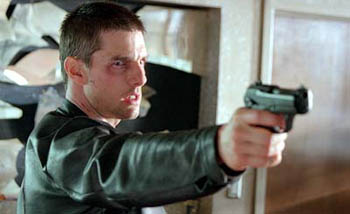![[Metroactive Movies]](/movies/gifs/movies468.gif)
[ Movies Index | Show Times | Silicon Valley | Metroactive Home | Archives ]
A Clockwork Cruise
'Minority Report' hints at deep Kubrickian issues but wimps out in the end
By Richard von Busack
STEVEN SPIELBERG'S most salient feature as a filmmaker is the way he mirrors films he's loved. In Minority Report, he's done over A Clockwork Orange. There are several ornamental references to the Kubrick film: a sinister executive named Burgess (May Von Sydow), as in Anthony; a strategically placed wino, like the one the droogs attack in the tunnel. But the real similarities between Minority Report and A Clockwork Orange lie in the question of free choice vs. the safety of society. This is a timely film; in Ashcroft's America, it rings a bell. However, Spielberg is restless with these ideas and prefers to cut to the chase.
Minority Report has a hell of a premise, anyway, taken from a short story by Philip K. Dick. In 2054, in Washington, D.C., a trio of future crack babies (the spawn of "neroin"-addicted mothers) are kept in a flotation tank. These shaven-headed clairvoyants, like the Three Fates, predict all the murders about to occur in the city limits. Their predictions unspool on computer screens as a fractured digital movie. The Department of Containment, which feeds and waters this trio, wants to take the program nationwide. (This detail seems more than usually weird--are they proposing to hot-wire all of the U.S.'s murders through these three pale Ophelias?) So far, the system is flawless, but one day the precognitives predict that Chief Anderton (Tom Cruise) will commit a murder. He runs for it, but the police forces he formerly unleashed on "future criminals" pursue him.
The gadgets along the way are the stars of the film: from retinal scans that allow animated billboards to address passersby by their first names to sonic pistols to police "sick-sticks" that disable criminals by making them projectile-vomit. Everyone's favorite bit will be the mechanical spiders the police use to comb buildings. In Spielberg's most ambitious shot, the roof of a residential hotel is cut away so we can see these bugs at work, shaking down the citizens. As for Cruise, he progresses through the film like a lump of food through a snake--the action moves him. The supporting actors make the film lively: Peter Stormare as an illegal eye-transplanter, Tim Blake Nelson as a macabre guard and Lois Smith as an expressionist maniac. People will come out of this movie exclaiming, "Lois Smith!" just as they came out of A.I. saying, "Jude Law!"
Minority Report is in better shape than A.I. But just as A.I. was, the film is hunchbacked with a bad final half-hour that swerves away from the right, serious ending into a ridiculous happy finale. The mealy colors--those CGI blues--and a plot that has to be explained at length make Minority Report a natural for techno-geeks. But its violence and its tired policeman-on-the-lam plot are less like the future than like a past of bad old movies.
[ Silicon Valley | Metroactive Home | Archives ]
![]()

You Cruise, You Lose Tom Cruise's police chief of the future must evade his own officers in Steven Spielberg's 'Minority Report.'
Minority Report (PG-13), directed by Steven Spielberg, written by Scott Frank and Jon Cohen, based on a short story by Philip K. Dick, photographed by Janusz Kaminski and starring Tom Cruise, Max Von Sydow and Lois Smith, opens Friday at selected theaters valleywide.
Send a letter to the editor about this story
.
From the June 20-26, 2002 issue of Metro, Silicon Valley's Weekly Newspaper.